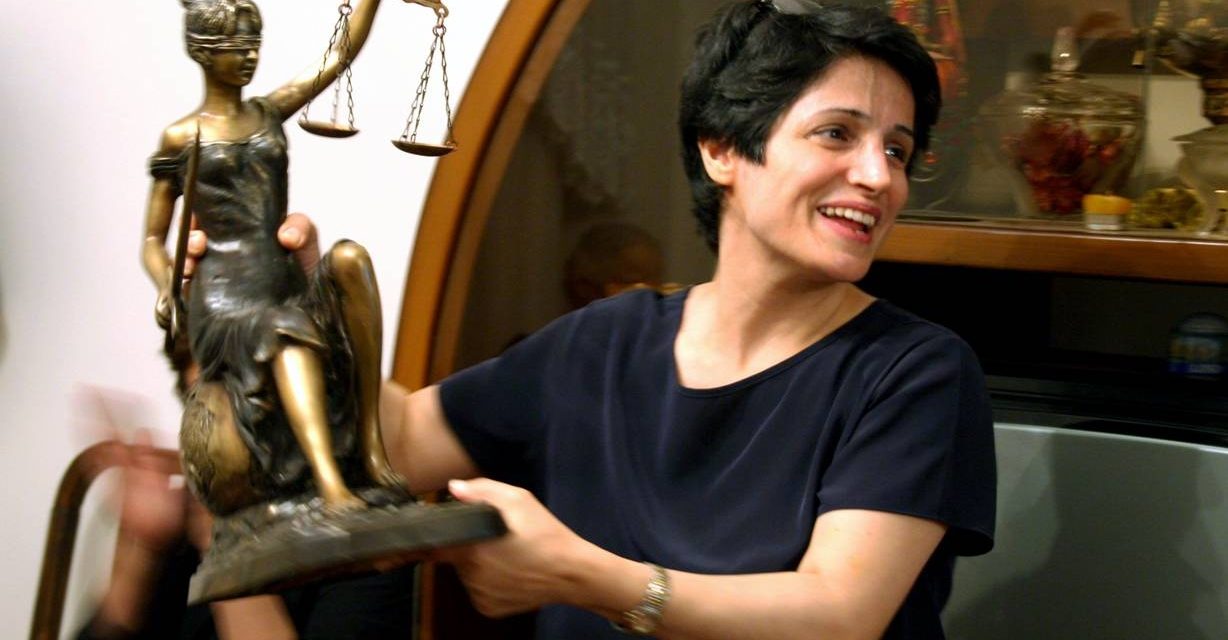Arseh Sevom, the NGO promoting human rights and civil society in Iran, speaks with Nasrin Sotoudeh — leading human rights lawyer and political prisoner from September 2010 to September 2013.
ARSEH SEVOM: Ms Sotoudeh, can you tell me what your ideal society looks like?
NASRIN SOTOUDEH: I have often been asked what my ideal society looks like. All activists ask this question of themselves over and over. My ideal society is a society in which rationality, love, sincerity abound instead of the military force and government intimidation: a society in which there is respect not only for women’s rights, but also for the rights of religious and ethnic minorities, children, and all people. This is the way we can live together in peace.
AS: What is your dream reality?
NS: I dream of human equality regardless of gender, color, race or any other factor. Equality is not something that happens overnight. Continuous efforts are needed. A woman involved in such an effort certainly leads a different kind of life, but not one that is necessarily worse than another’s. Children with such mothers may suffer in comparison to others, but they do come to understand why they had to endure such hardships.
AS: How have your efforts to reach your ideals affected your personal life and your family: especially your children Nima and Mehraveh?
NS: You know three and a half years ago, I was sent to prison on political charges. At that time my children were small. Because of my husband’s great parenting, they could bear my three year absence. With his parenting and his untiring efforts to educate our children, my husband showed his lifelong commitment to equality.
During my three-year absence from my family, I saw natural changes in my children. They had grown. My daughter was 11 when I was arrested. Now that she is 14, she knows why her mother was away for three years. I’m suddenly faced with a young girl who has a rationale for her decisions and my son, who at the time of my arrest could not even understand the concept of imprisonment, is now six years old. A toddler’s mind dealing with the concept of imprisonment, crime, theft, and political offenses, and the mistakes of the police! And thus, he has been introduced to all these things.
He has lost his childhood. He often asks me, “When did I grow up”? “I grew up all of a sudden,” he says. His memories of me are from prison.
AS: I remember before you worked as a lawyer, you were a children’s’ rights activist. The “Association for the Protection of Child Rights” was established to protect the rights of children and you were one of its founders. Did the rights of your children come at the expense of your ideals?
NS: These stories are, of course, upsetting. But let me share my experience with you and tell you that we do have to pay the price of our ideals. This is an unwanted cost. If you say that it is paid at the expense of my children, I definitely agree with you. And if you say, we have no right to pay the price of our ideals at the expense of our children, again, I agree with you.
Is there a point of intersection between human rights and motherhood? On International Women’s Day, we have the right to speak about our problems. If a mother is working for children’s rights, she will certainly try to defend the rights of her own child, and if she suffers, the whole family suffers. What should I do? Should this mean that we give up our vision? Definitely not.
As we , in order to empower our children and educate them, impose the difficulty of going to school on them, we, in our turn, should tolerate some hardship ourselves to teach our children that to a price must be paid to get something valuable.
Our share of the cost to achieve justice and equality has simply been “distance” and “nostalgia”. Just this. In comparison to the ideals we are trying to achieve, it’s not much.
AS: Finally, how do you see the future?
NS: I am a symbol for equality and justice, and I fight for this through my legal practice. As long as I am able, I will fight for these ideals. If they close that path on me, I will struggle to open it with every right I have as a human being.
Of course I am optimistic for the future. I have no doubt that equality will prevail, because without equality you cannot have peace and love, and without peace and love, life is empty.

